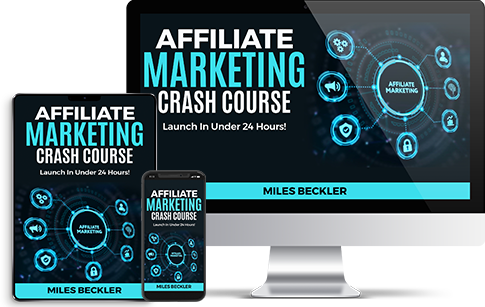The idea of “niche marketing” has been around for over 100 years.
But today, it's never been easier to hyper-target your message to the EXACT people who seek what you offer.
With the rise of smartphones, voice search assistants, search engines, social media and a 4G connected world, the riches are in the niches!
Focusing in on a hyper-targeted niche can be the #1 recipe for success and it can speed up your path to profitability.
In fact, mass marketing has all but disappeared for everyone but the mega-billion dollar companies who have hundreds of millions to spend on 'old-school' media.
For you, the #1 opportunity in getting your brand, your products and your services known by those who want what you offer is to become the expert in your niche...
Ready to get crystal-clear on your niche so you can DOMINATE?
Great...
Let's jump in!
What Is a Niche Market?
A niche market is a small, targeted group of consumers. It is specialized and extremely focused and requires a marketing strategy to reach them.
How It Works
Let’s say, for example, that you sell toys for kids.
Now, let’s say your best-selling toy is for kids between the ages of six and ten.
Maybe your toy is best suited for boys aged 6-10.
Going deeper, you may be able to further narrow that group down by interest.
Let’s say you have a STEM toy (Science, Technology, Engineering & Math) like the Turing Tumble toy that teaches kids the basics of computer programming with a simple marble based game.
Now, you're targeting parents of boys aged six to ten who want their children to engage with science, technology, engineering and mathematics.
Do you see how we quickly went from a market containing all the kids ever born to a small subset of children?
Now, imagine you ran a Facebook ad for this toy focusing only on parents aged 28 - 38 with children between the agees of 6 and 10 who live in silicon valley and work in tech.
Do you think this audience would have a higher likelihood of buying your computer programming game than parents of kids in North Dakota or Mississippi?
Of course they would!
Not that you can't sell to the other markets, but you'd use different messaging to target those audiences.
Make sense?
This is how FAST growing companies are scaling today... Hyper-focus on their niches.
I call this process "niching down" and it is vital to you success in our current age of marketing...
Because it has never been easier to hyper-target your PERFECT customer than it is today!
Goals
Your main goal here is to discover a very narrow focused audience that has different needs than the 'mass market' and create targeted messaging that speaks to their unique situation better than your competitors.
If your product has mass market appeal, you still want to create targeted marketing and messages for the different segments within your niche...
Again, our silicon valley family would respond to a different message than our North Dakota family... They are different audiences with different needs and desires, so you must niche down your messaging for each.
Your advertising and marketing budgets will go much farther and will be able to generate more sales through targeted campaigns vs. mass marketing.
Remember...
The right message for the right audience at the right time = success!
Examples of Niche Groups
- Location: Target a small geographical area, like people in a certain small town or zip code, with special products offered exclusively to their community.
- Profession: These can often be large markets, but you can narrow these down to create niche areas. Maybe you cater to fine dining and craft bartenders specifically. If not, your products are best for dive bar servers. Focus your marketing there.
- Lifestyle: Vegans have become a huge niche market. Even just five years ago, you might only have found a single vegetarian option on some menus. Vegan was almost never an option. These days, however, even the largest of businesses offer vegan options. The same can be said for those with gluten concerns. Still, unless they go to a very specialized business that caters directly to their needs, they’re unlikely to find completely satisfying options that taste great. That’s a niche market.
- Occasion: Create products for specific occasions. Maybe you are the best provider of customized quinceanera piñatas. Perhaps you are the best Bar Mitzvah DJ in your neighborhood. (See what I did there? I created an even smaller niche by mixing the location and occasion needs to create a smaller niche!)
Advantages
This form of marketing is great because it can really let you stand out from the crowd.
Let's say you are a DJ and you love 1980's music... You've got the best playlists, the best mixes and the best gear for an authentic 1980's style dance party...
Sure, there are probably hundreds of DJs in your area.
But when you are known as the #1 DJ for 1980's themed parties...
Who is your PERFECT customer going to call when they are planning an 80's themed party (or wedding or school dance)?
You are the obvious choice IF you took time to create the right content with the right messaging that positions you as the best 80's DJ in your area.
Do you see how it works?
Why would they go to a general DJ when they can find one that understands them on a personal level?
That's the recipe for success, right there.
Find Your Niche
Now that you’ve learned what a niche is, it’s time to find your own niche to sell your products and services.
This can seem overwhelming—especially if you don’t feel like you’re an expert at something specific or there are several potential niche markets for you. That’s okay. We can help.
Worksheets
First, there are a lot of products that may have more than a niche market. When you're answering the questions we're about to dive into, you may want to have some paper handy. Any time that a question has more than one answer, separate the answers on different pieces of paper.
Continue the process for each piece of paper. If you fit squarely into several niches, then you can develop specific targeted marketing for each market.
Return on Investments (ROI)
It takes a bit more time and effort than a single, more generalized marketing campaign, but you will see far greater sales numbers overall when you can specifically target consumers in a way that makes them wonder whether you were listening in on their conversations…otherwise how could you know that they desperately wanted exactly that thing?
Simple Path to Your Niche Business
I came up with a strategy to focus my own personal niche in the world using this rule of thumb. Your niche is where your talents, your passions, and the needs of others intersect.
What Are You Good At?
When looking for niche ideas, make a list of your talents—all of them. When it comes to ideas, think both inside and outside of the box.
Think about professional skills and hobbies. If you want some examples when choosing a niche, here are some of the things you can come up with when you make a list:
Creative Skills
- Singing and Acting: What sort of creative talents can you use?
- Crafting: Are you handy with scissors, glue guns, glitter, or sewing machines?
- Comedy: Are you witty or humorous? This is a skill set.
These are just a few examples of creative talents and skill sets. What other ones apply to your life?
Professional Skills
- Organization: Can you find a place for everything and anything? Do you always know how to find it? Good with systems?
- Writing and Editing: Are you good at grammar? Can you write well?
- Languages: Are you bilingual? How about tri- or quad-lingual?
- Bartending: Can you make a mean craft cocktail?
These are just a few examples of workplace skills. Can you think of other workplace skills you’ve developed and honed?
Interpersonal Skills
- Networking: Can you make a great first impression? Do you keep regular contact with the potential clients and other people you meet?
- Fortitude: Can you do what it takes to get things done? Are you able to stick with projects and see them through to completion?
- Patience: Can you keep a level head no matter how upset you get? Are you able to deal with people calmly no matter how rude they are?
These are just a few examples of interpersonal skills. How many do you have?
Notice how this list contains a blend of abstract and specific talents that encompass both hobbies and professional skills. Not all of these would fit on a single resume—and they’re not meant to. Most professionals these days craft a different resume specifically tailored to each job they apply for. And it works exactly like niche marketing.
Knowing the things that you are talented at doing can open your eyes to markets and skill sets you’ve never considered before. Being an entrepreneur may make use of those talents you thought you could never make a living doing and once you find a niche market you will have far less competition.
Once you’ve got a list, the next thing to do is highlight. Pick your top three–five strengths and highlight these. Are any of these skills receiving both a highlight and a star? The skills that get both are the basic building blocks for your niche.
What Are Your Weaknesses?
While it is important to know your talents and focus on them, it is also a good idea to take a little bit of time to admit your weaknesses. Knowing them can help you avoid ending up in the wrong niche.
If you're great at singing and a patient person and passionate about theater and education, you may be tempted to venture into a performance-based niche market…but, as it turns out, you're incredibly shy and suffer from stage fright. Oh dear, perhaps you should have focused on teaching and coaching, instead.
If you’re also a talented writer, maybe a better bet would be theater, blogging or taking a job with a local newspaper writing reviews for the local arts scene.
Examples
- Bluntness: A lot of people who are very straightforward can often lack tact. While being straightforward is a strength, bluntness can easily become a weakness if you forget to couch your constructive criticism in kindness.
- Easily Bored: A lot of people find it difficult to concentrate on a single task for too long if that task becomes repetitive. If you’re easily bored, this is an important weakness to recognize because it means you will need to find a niche that offers a lot of excitement instead of routine.
- Time of Day: Some people like to catch the worm so to speak while others are night owls. Know what time of day you function best…and when you become a zombie.
- Anxiety: Let’s be real. A lot of people struggle with depression and anxiety these days. It isn’t a death sentence, but it does affect how we live our lives. If this is you, then acknowledge it. Find creative ways to cut down on situations that could trigger it.
- Math: As easily as this can be a major strength for some people, others struggle with it.
Again, this list encompasses professional and interpersonal skills. Just as there are tons of strengths, any one of them could be someone else’s weakness. This diversity is what makes the world a fun place to be.
It’s also what makes it necessary to depend on one another for different goods and services that we’d be utterly unable to provide for ourselves.
Admit your weaknesses and avoid playing into them.
But don’t dwell on them! Lean into your strengths and play them up instead. Focus on the positives. Build your niche around the things you do well.
What Are You Passionate About?
These are the things you are interested in. Good or bad, they fuel your passion and make you tick.
Social Justice Causes
- Human trafficking
- Homelessness
- Veterans affairs
Political Involvement
- Environmentalism
- Foreign aid and missions
- Religious affiliations
- PACs and political campaigns
- Local government
Other Examples
- Helping People: Are people a passion of yours?
- Theater: Do you love the arts?
- Numbers: Does a specific skill set get you so excited that it can easily be considered a passion rather than simply a skill?
The next step is to look at your building blocks from your talents. Find out how they fit into these passions. For example, singing and theater match up well. Organization and writing go well with helping people. Any of these talents fit right in with social justice.
Narrow It Down. What Can You Specifically Do?
Now that you know what skills to offer and where to start looking, the next thing to do is find a problem you can solve.
For example, if you love to help people as a passion and you’re great at organization and networking, why not start a nonprofit or organize charity benefits and fundraisers?
What Will People Buy?
This is the final question to ask. When you’ve identified your best skills, how they relate to your passions, and what problem you can solve with them, figure out who will pay for that solution.
Profit
If it's not profitable, reset or put things on hold until the need becomes urgent enough that people will buy.
For example, if you picked singing and theater and there's an audition in your town soon for a volunteer-based community theater, that's a great hobby for you but it isn't a viable niche market you can make a living with.
Now, if you are talented at writing and passionate about the theater, there just might be an opening with your local paper for a freelance
Arts writer or you may be able to make great money with a specialized arts and recreational blog about your city that features advertisements for small local businesses if they’d like to pay for space and generates regular enough click traffic that Google ads will work for them.
If your talents are education and singing and you have a passion for theater, there are very likely plenty of parents out there willing to pay good money for voice lessons for their children.
Specialize
Specialize. Become the local expert at coaching a specific genre. Maybe you specialize in preparing for musical theater auditions. Perhaps you’re the go-to expert on classical vocals. Do you know a lot of great technical stuff about singing? You could market yourself as the expert on breath support and ensuring long term vocal health and proper technique.
What if I Already Have a Product in Mind?
If you already have a product, then use your skills to narrow your market.
For example, let’s take two people who are talented writers that are also great at networking and passionate about helping people.
One focused on helping people find their own passions and grow their business through their writing. The other took a job with a nonprofit.
He uses his skills to write grant proposals and meet with potential donors. Same skills, very different niche markets. Both successful.
Conclusion
Now, you know what a niche market is and how to find your area of expertise. Remember that there isn't really a single correct answer. I used one set of skills to throw a benefit. I've done a lot of other things, too, and not all of them use the same set of skills.
Figure out where your talents and passions can meet a market need—and get in the game!
With niche markets, it’s better to cast a narrow net but dig deep into that area. Overspecialize to the point that you become the single, leading expert in a very specific market.









